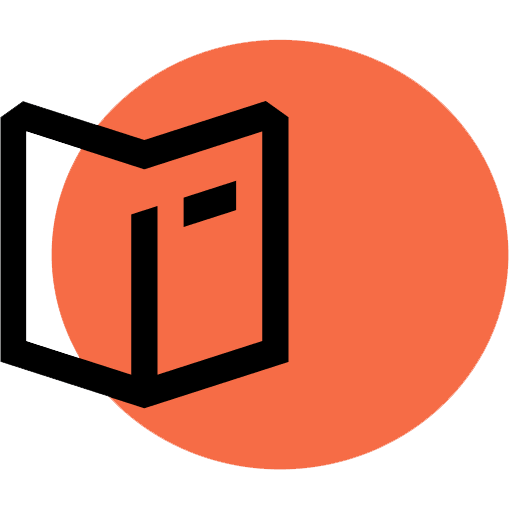Table of Contents
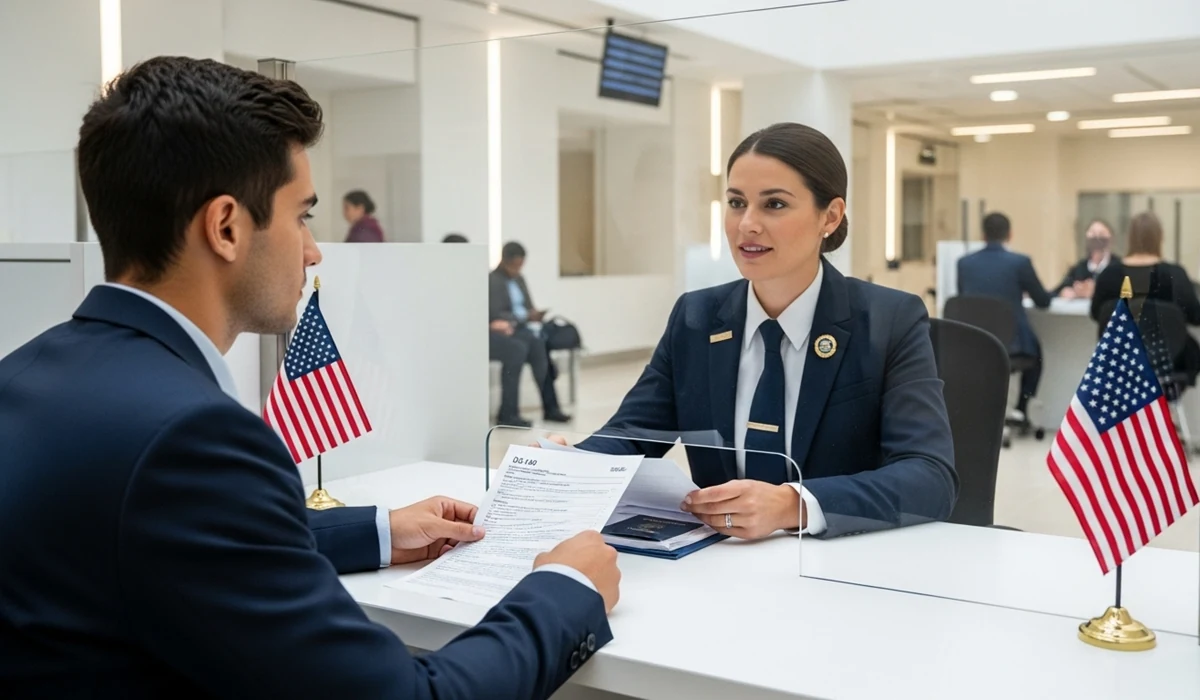
Knowing what US visa interview questions you need to prepare for can make a huge difference in your visa case. Your interview is your chance to show the officer that your purpose is genuine and your plans are clear.
In 2025, officers are looking more closely at financial proof, home ties, and honest, consistent answers. Join the Visa Library to learn what happens before, during, and after your visa interview so you can walk in confident and prepared.
What Happens During the US Visa Interview?
The US visa interview is usually quick and straightforward. When you arrive at the embassy or consulate, security staff will check your passport, appointment letter, and DS-160 form. You’ll pass through security, so don’t bring phones or large bags.
After that, you’ll sit in a waiting area until your number is called. When it’s your turn, you’ll meet a consular officer at a window or in the interview room. They’ll ask you the US visa interview questions about your trip, job, studies, and finances. Your answers should be short, honest, and clear.
Most interviews last only a few minutes. If your visa is approved, the officer keeps your passport to add the visa sticker. If more documents are needed, they’ll tell you what to send.
Common Questions Asked in US Visa Interviews in 2025
The consular officer will ask the US visa interview questions to understand your purpose, background, and if you plan to return home. Most of them are simple but important. Here’s exactly what they mean and how to answer them:
Confirm Your Name, Identity, and Contact Details.
This is a standard start. The officer just wants to match your answers with your DS-160 form and passport. Speak clearly and make sure you use the same spelling and address you submitted in your application. Bring your passport and appointment confirmation.
When Do You Plan to Travel to the US? Why Now?
This US visa interview question is important. They want to check if your travel dates make sense and match your documents. Say the exact month or week you plan to go and explain the reason, like a work meeting, family event, or semester start. For example, say “I plan to travel in July because my conference starts on July 15.” Don’t give vague answers like “sometime this year.” Bring your invitation letter or flight estimate if you have one.
Who Will Be Travelling with You?
With this US visa interview question, the officer checks if you’re traveling alone or with family. If you’re going with someone, give their name and relation. If you’re going alone, explain why. Explain that, for example, your spouse is busy with work or your children have school. Honest, calm answers are best.
How Long Will You Stay in the US?
They’re making sure your stay fits your visa type. Say how long, for example, “two weeks,” “one month,” “six months,” etc. Also, give a clear reason. For example, say “My training program lasts for four weeks.” Don’t say “as long as possible.” Bring return tickets or program schedules if possible.
What is the Purpose of Your Trip?
This is a key US visa interview question. Say exactly why you’re going, such as tourism, visiting family, business, study, or treatment. Keep it short and real: “I’m going to my brother’s wedding,” or “I have a medical appointment at XYZ clinic.” Your answer must match your DS-160 and supporting papers. Bring proof like invitations, enrollment letters, or appointment confirmations.
What are Your Plans While in the US?
They want to see you have a plan, not just an excuse to enter. Say what you’ll do: sightseeing, attending a wedding, taking part in a course, or visiting specific places. Don’t say “I haven’t decided yet.” If you have a schedule, mention cities or dates. Having a basic itinerary shows you’re organized.
Where Will You Stay in the US?
They ask this US visa interview question because they need to confirm your accommodation. Be specific and give the address or hotel name. For example, say “I’ll stay with my cousin at 123 Main Street, Dallas.” If you’re a tourist, say your hotel’s name and show your booking confirmation. Don’t say, “I’ll find a place later.”
Have You Been to the US Before?
With this US visa interview question, the officer checks your travel record. If yes, say when and why you went. For example, say “Yes, I visited New York in 2019 for tourism.” If not, say “No, this will be my first trip.” Be honest; they already have access to your travel history.
Have You Ever Been Convicted of a Crime?
They’re checking your background. If you’ve never had any issues, say “No, I have not.” If you have, you must be honest and explain briefly: “Yes, I was fined for a traffic violation.” Lying about this is serious and can lead to a ban. Bring any court or clearance papers if you have a record.
If You Have Any Relations in the US, Please Give Details.
They want to know your connections there. Say who they are and where they live. For example, say “My sister lives in Houston.” You can mention if you plan to visit them. Don’t hide information; officers already have family link data.
Do You Have any Children? If so, how many? How Old? Where do They Live?
This US visa interview question helps prove your family ties at home. Say their names, ages, and if they live with you. For example, say “I have two children, ages 10 and 13, both in school in my city.” It shows that you have responsibilities to return to.
Have You already Bought Travel Tickets? Are These Return Tickets?
They want to see if your plans are real. If you’ve bought tickets, show them. If not, say you’ll book once your visa is approved. Always mention a return ticket because it proves your intent to go back. Don’t give fake dates or made-up bookings.
Do You Have Medical Insurance?
This US visa interview question is common for tourists or older applicants. If you have travel insurance, show the policy or receipt. If not, say you plan to buy one before the trip. It shows that you’re prepared and responsible.
How Much Do You Expect the Trip to Cost?
They’re testing if you’ve budgeted properly. Give a clear estimate based on your trip type. For example, say “About $3,000 for flights, hotels, food, and sightseeing.” Don’t say “I haven’t thought about it.” You can bring your cost plan or proof of funds.
How are You Funding Your Trip?
This US visa interview question checks your financial stability. If you’re paying yourself, say, “I’ll use my savings,” or “I’m sponsored by my employer.” If family members are helping, name them and show proof like bank statements or sponsorship letters. Don’t give unclear answers like “I’ll manage.”
Have You Visited the US Before?
This question can be a trap. Sometimes this is repeated to see if you answer consistently. Just give the same truthful reply as before. It’s fine if it feels repetitive, so stay calm and consistent.
Will You Work While in the US?
This US visa interview question checks if you understand your visa rules. If you’re on a US tourist or visitor visa, the answer must be “No.” You can say, “I know work is not allowed on this visa.” Only student visa holders can mention legal on-campus jobs. Never suggest working unofficially. It leads to an instant refusal.
Do You Have any Relatives in the US?
Again, this US visa interview question checks your consistency. Say yes or no clearly, and if yes, mention their name, city, and relationship. Don’t give extra details unless asked. Officers sometimes repeat questions to test your honesty.
Have You Ever Travelled Outside Your Home Country Before?
They’re checking your travel history. If you have traveled abroad, name a few countries and years. For example, say “Yes, I’ve been to Canada and Italy in 2022.” If not, say, “No, this will be my first international trip.” Having no travel history is not a problem. Just stay honest.
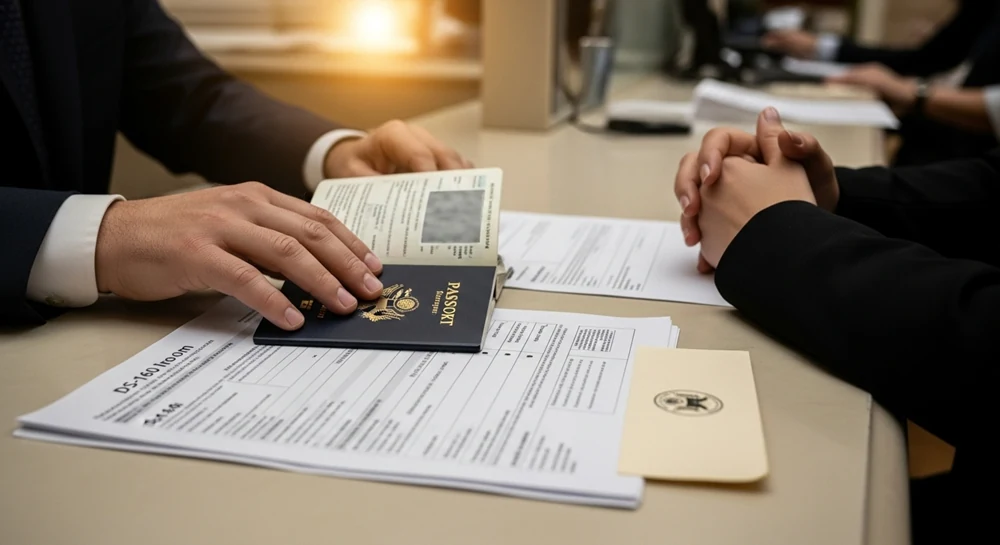
Can You Show any Evidence that You Will Leave the US and Return Home?
This is one of the most important US visa interview questions. The officer wants proof that you’ll come back. Talk about your job, property, family, or business in your home country. Say, “I have a job and family here, and I own a small apartment.” Bring supporting proof, such as your employment letters, property deeds, or family documents. Don’t say things like “I’ll decide later.”
What Do You Do for a Living?
They want to know your income source. Say your job title and briefly describe what you do. For example, say “I’m a teacher at ABC School.” If you’re self-employed, say what kind of business you run. Bring payslips, tax documents, or business registration papers.
Where Do You Work and How Much Do You Earn?
This US visa interview question checks if your income matches your travel costs. Be specific and say something like “I work at XYZ Company and earn around $2,500 per month.” Bring your employment letter or salary slips. Don’t exaggerate your income. Officers can tell when numbers sound unrealistic.
If You are Employed, Are You Taking Annual Leave?
They want to see if your employer knows about your trip. Say yes and mention you’ve got official leave approval. You can show a letter or email from your HR or manager confirming your leave dates. It proves you have a stable job to return to.
If You Work for Yourself, Who Will Look after Your Business?
This tests whether your business will keep running while you’re gone. Say, “My partner or manager will handle it,” or “I have a team managing daily operations.” Show any registration or business license documents. Saying “I’ll close it” makes it sound unstable.
Do You Intend to Stay in the US?
This US visa interview question can be a trap. The officer is checking your true intent. The right answer is short and clear: “No, I will return home after my trip.” Don’t joke or say, “Maybe if I like it.” That can get you refused immediately.
What Assets Do You Have in Your Home Country?
They want to see proof of your financial and personal ties. Mention real things, like “I own a small apartment and a car,” or “I have savings and property in my hometown.” Bring proof if possible. Assets make your return more believable.
Documents to Bring to Your US Visa Interview
- Valid passport (current and any old ones with previous visas)
- DS-160 confirmation page with barcode
- Visa appointment confirmation letter
- Recent passport-size photo (as per US visa requirements)
- Visa fee payment receipt
- Proof of financial stability (bank statements, payslips, tax returns)
- Employment letter or leave approval (for employed applicants)
- Business registration or income proof (for self-employed)
- Property ownership or rental documents (to show home ties)
- Marriage certificate or family documents (if applicable)
- Invitation letter from US contact (if visiting family or attending events)
- Proof of relationship to sponsor (birth or marriage certificate)
- Sponsor’s financial documents (bank statements, tax returns, job letter)
- Travel itinerary or flight booking (round trip if possible)
- Hotel booking or accommodation details
- Travel insurance (especially for tourists or seniors)
- Educational certificates and transcripts (for student visas)
- I-20 form and SEVIS fee receipt (for F-1/M visas)
- Admission or enrollment letter from the school/university
- Employer’s invitation or conference letter (for business visas)
- Medical documents (if traveling for treatment)
- Proof of previous international travel (visas, entry stamps)
- Cover letter summarizing travel purpose (optional but helpful)
What Happens After your US Visa Interview?
Once you answer all of the US visa interview questions and your interview is finished, you’ll know your result fairly quickly. If your visa is approved, the officer will keep your passport so the visa stamp can be added. You’ll get it back within a few days through the courier or pickup location you selected when booking your appointment.
If your visa is refused, the officer will explain the reason. Most refusals happen under section 214(b), which means they weren’t convinced you’ll return home. Sometimes, you might get a 221(g) notice asking for extra documents or administrative processing. That doesn’t mean rejection, just more review.
If you’re asked to submit more papers, follow the instructions carefully. Upload or deliver the documents exactly as told and keep a copy of everything.
Once your passport is ready, you’ll get an email or SMS with tracking details. Check the visa stamp when you receive it to make sure all the information is correct, including your name, date of birth, and visa type.
After that, you can plan your trip, book your flights, and prepare for entry at the US border. Keep your visa approval letter, passport, and supporting documents with you while traveling.
Questions Asked During US Visa Interviews: Let’s Recap
Once you understand the US visa interview questions, getting ready for your visa interview isn’t stressful anymore. Learn how to give clear answers, and you’ll feel more in control.
At Visa Library, we help visa applicants every step of the way. We offer both free and premium visa consultation services to guide you through the process, review your documents, and prepare you for your interview.
Book your visa consultation today and take the next step toward your US visa with confidence.
US Visa Interview Frequently Asked Questions
What kind of questions do officers usually ask in a US visa interview?
Officers mostly ask about your travel purpose, how long you’ll stay, who’s paying for the trip, your job or studies, and your ties to your home country.
How much time does the US visa interview take?
Most interviews last just a few minutes; often less than five. Decisions are usually made right after the conversation.
What should I bring with me to the visa interview?
Bring your passport, DS-160 confirmation page, appointment letter, visa fee receipt, and all supporting documents that prove your finances, purpose of travel, and ties to your country.
Am I allowed to have a translator during my interview?
Yes, but only in rare cases and with approval. Most interviews are conducted in English, so if you need a translator, mention it when scheduling your appointment.
What should I do if I don’t understand what the officer is asking?
Politely ask them to repeat or explain the question. It’s better to clarify than to give the wrong answer. Officers expect this and won’t mind.
Can my visa be refused based only on my interview?
Yes. Even if your documents are strong, unclear or inconsistent answers can lead to a refusal. Confidence, honesty, and consistency matter most.
What happens if my visa gets denied?
The officer will give you a paper explaining the reason. You can reapply anytime, but it’s smart to fix the issues from your first application before applying again.
Is there a specific dress code for the interview?
There’s no formal dress code, but wear neat, clean, and modest clothes. You don’t need to dress up and look presentable and professional.
Can I change or reschedule my interview date?
Yes. You can log in to your visa appointment account and select a new date. Try to do it early, as available slots fill up fast.
- Author
- Max-B.
- October 23, 2025
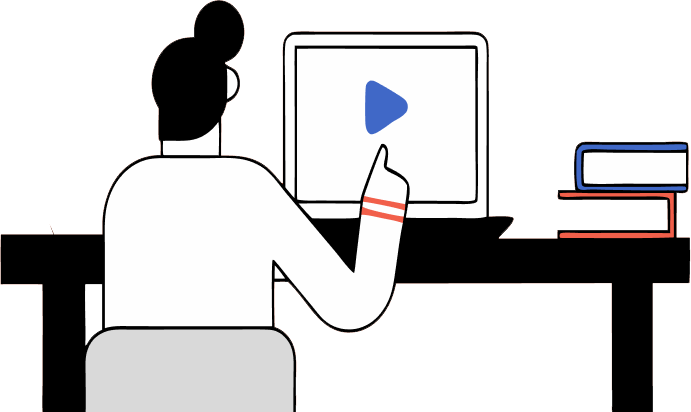
Sign Up to Online Course
Related Articles
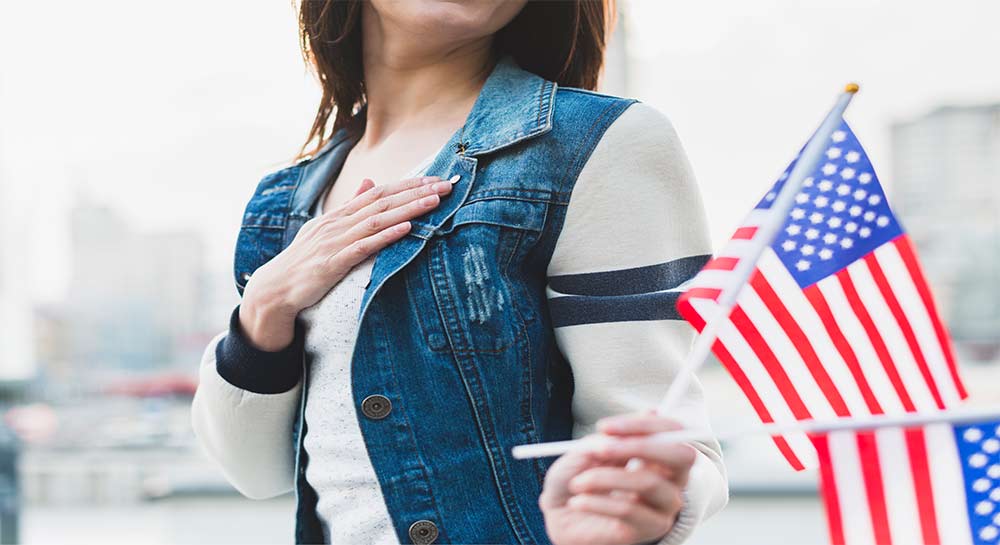
US EB‑5 Investor Visa Interview Questions
The EB‑5 visa interview is a key step in the U.S. immigration process. At this stage, the consular officer checks
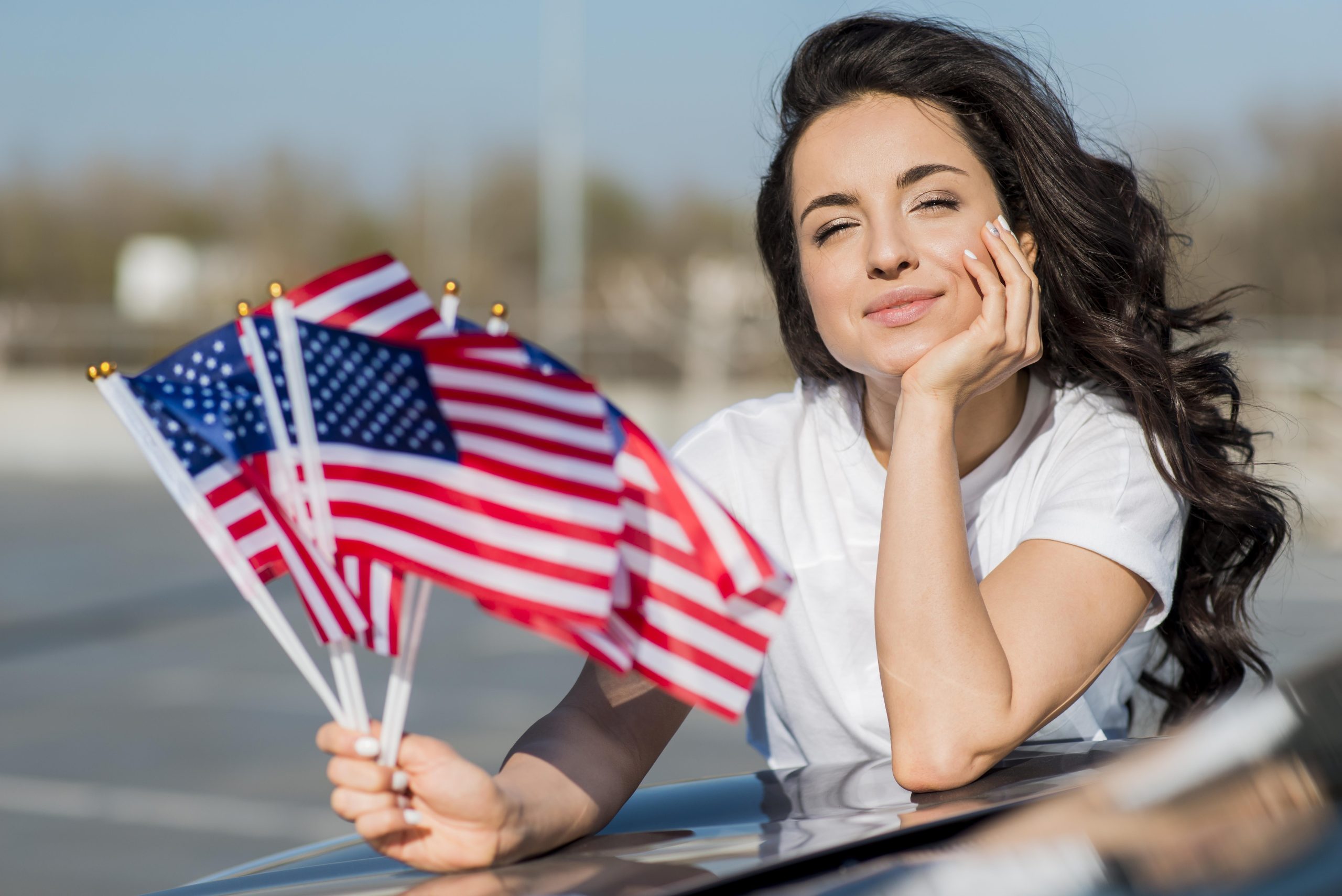
US O‑1 Visa (Extraordinary Ability) Interview Questions
The O‑1 visa lets people with special skills work in the United States. After USCIS approves your petition, the last
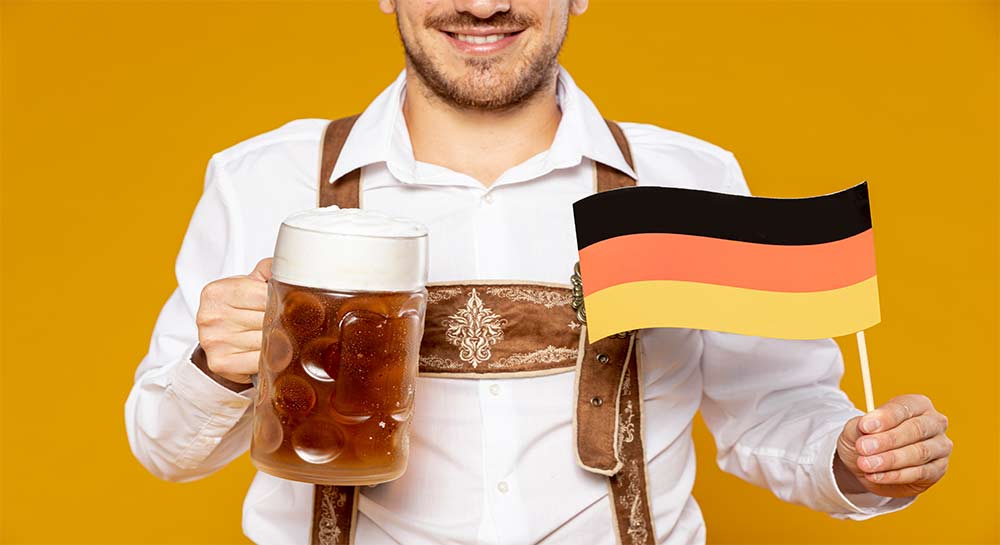
German Student Visa Interview Questions
Students must attend a visa interview before they study in Germany. The officer checks if the student is ready for

